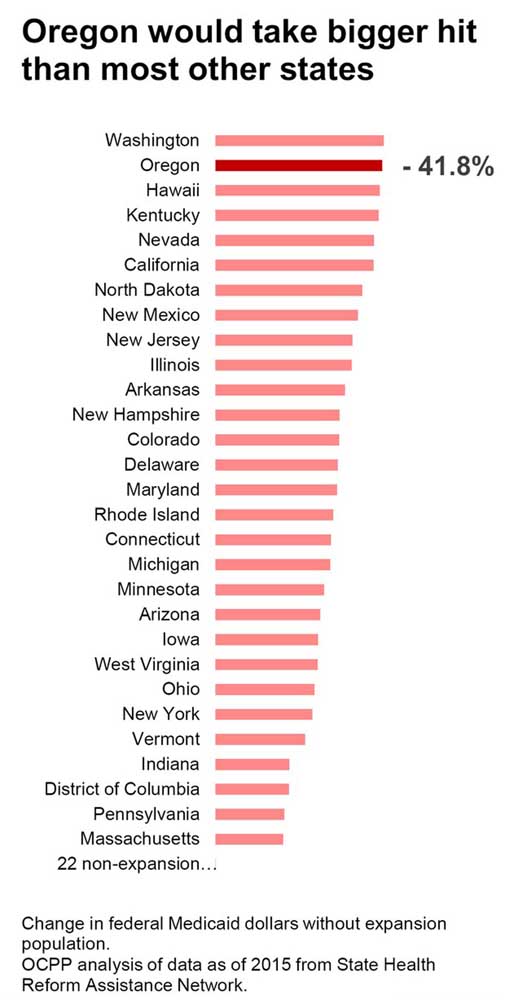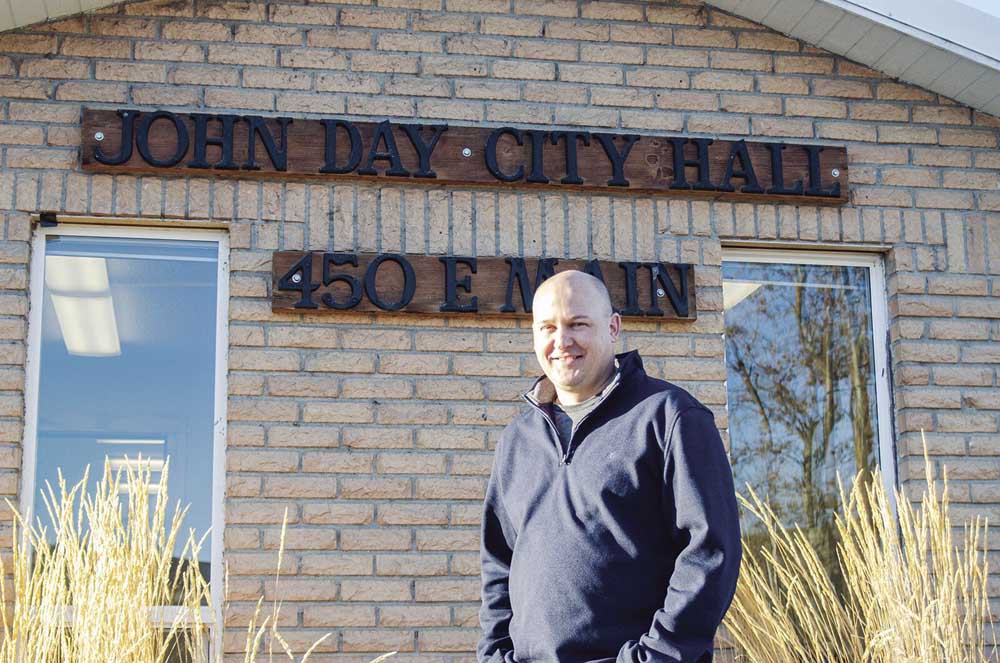Obamacare replacement shot down
Published 10:40 am Friday, March 24, 2017

- Graph courtesy of the Oregon Center for Public Policy
Unable to gather the necessary votes, the U.S. House of Representatives postponed voting on the American Health Care Act, which would have replaced Obamacare.
“Obamacare is the law of the land. It’s going to remain the law of the land until it’s replaced. We did not have quite the votes to replace this law,” Speaker of the House Paul Ryan said in a press conference. “We’re going to be living with Obamacare for the foreseeable future.”
The bill, supported by U.S. Rep. Greg Walden, would have phased out Obamacare’s Medicaid expansion, which could have had significant impacts in rural Oregon.
As many as 375,000 Oregonians covered by the Oregon Health Plan under the Medicaid expansion could have lost health care coverage unless the state paid a greater percentage of the cost, according to a recent Oregon Center for Public Policy report.
“Oregon’s Medicaid program would take a bigger hit than nearly all other states, should the GOP proposal be enacted,” the report, authored by Janet Bauer, said. “This is because the federal Medicaid expansion dollars support a larger share of our Medicaid program budget than in nearly every other state.”
The Republican replacement would have phased out additional federal matching dollars for Medicaid beginning in 2020. Until then, people could have still signed on to the Oregon Health Plan to receive Medicaid. After 2020, those enrolled would continue to be covered but only for as long as they remained enrolled without interruption, according to the OCPP.
Almost 20 percent of people in Grant County are served by a community care organization as part of OHP, according to a state report. In 2014, 12 percent of people under 65 did not have health insurance in Grant County, the DHS reported.
If the AHCA was enacted, the Oregon Health Plan would have lost 41.8 percent of federal funding, according to the OCPP. To continue funding those on Medicaid, the state would have had to nearly quadruple its contributions.
Republican proponents said the plan would take control of health care away from the federal government and give it to the states, giving citizens more flexibility on how they spend their money on healthcare.
The AHCA would have eliminated individual and employer mandate penalties, established a Patient and State Stability Fund to provide states with $100 billion to design programs that meet the unique needs of their patient populations and helped low-income Americans afford health care by providing a tax credit between $2,000-14,000 a year for low- and middle-income individuals and families.
Women would not have been able to use tax credits to purchase a plan covering elective abortions.
Like Obamacare, the GOP replacement would have prohibited insurers from denying coverage or charging more money to patients based on pre-existing conditions and allowed dependents to stay on a parent’s plan until the age of 26.
Obamacare taxes, including taxes on prescription drugs, over-the-counter medications, health insurance premiums and medical devices, would have been removed, according to the GOP.
“Under our plan, we preserve important provisions like protecting patients with pre-existing conditions while implementing important reforms to provide states with greater flexibility, lower cost for families, and greater choice for patients,” Walden, the chairman of the Committee on Energy & Commerce, said.
In Walden’s district in rural Oregon, Medicaid enrollment through the Oregon Health Plan surpassed 30 percent in eight of the counties. About 129,200 people in the district are covered by the Medicaid expansion. The district’s uninsured rate dropped from 17 percent to 8 percent under Obamacare.
Walden’s district expanded Medicaid more than any other Republican district in the country, according to a report by the U.S. House of Representatives Committee on Energy and Commerce.
Over half of all children in Walden’s district rely on Medicaid, and 30 percent of Oregonians in rural counties rely on the OHP, compared to 24 percent of residents in urban counties. Walden’s district has the most residents, 29 percent, who rely on the OHP, according to the OCPP.
“Our analysis found that for every step of progress that Oregon made, the American Health Care Act will take Oregon three steps back,” Gov. Kate Brown said. “Since 2014, we have made tremendous progress to ensure that nearly every Oregonian has access to health insurance coverage. The ripple effect of pulling healthcare out from under Oregonians is widespread, from families, to doctors, to hospitals. I look forward to sharing their voices with Oregon and Congress.”
Under Obamacare, Oregon extended Oregon Health Plan coverage to approximately 400,000 Oregonians who lacked health insurance, and today OHP covers more than one in four Oregonians, including almost 40 percent of residents in some rural parts of the state, according to a report released by the state.
More than 95 percent of Oregonians, and 98 percent of children, now have health care coverage. The uninsured rate could triple if Obamacare’s health insurance subsidies and Medicaid expansion are repealed, according to the state.
Obamacare also created a marketplace for people to find health insurance and subsidies. Over 155,000 Oregonians have signed up for health insurance through the marketplace since the end of January, according to the state.
The nonprofit Economic Policy Institute estimated Oregon would also lose a total of 42,000 jobs if Obamacare was repealed.
EO Media Group senior reporter Kathy Aney contributed to this report.





